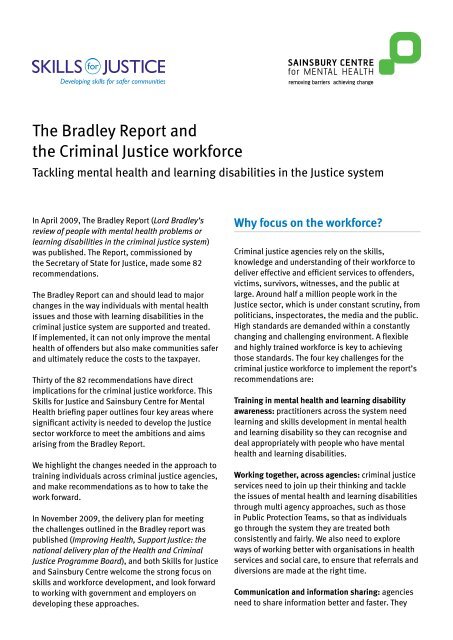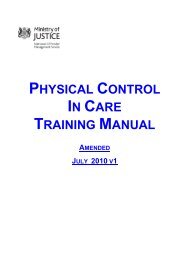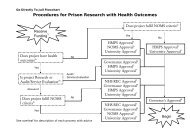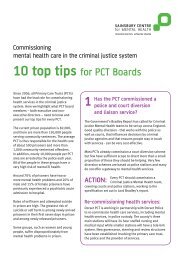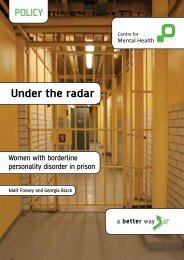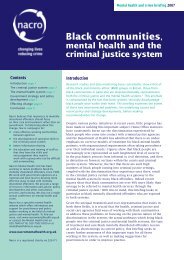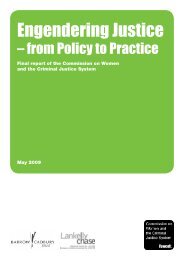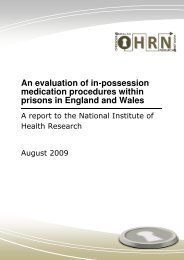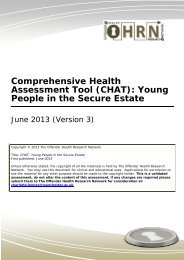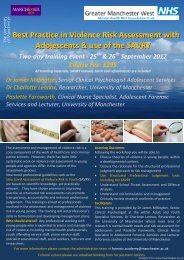The Bradley Report and the Criminal Justice workforce - Centre for ...
The Bradley Report and the Criminal Justice workforce - Centre for ...
The Bradley Report and the Criminal Justice workforce - Centre for ...
- No tags were found...
You also want an ePaper? Increase the reach of your titles
YUMPU automatically turns print PDFs into web optimized ePapers that Google loves.
<strong>The</strong> <strong>Bradley</strong> <strong>Report</strong> <strong>and</strong><strong>the</strong> <strong>Criminal</strong> <strong>Justice</strong> <strong>work<strong>for</strong>ce</strong>Tackling mental health <strong>and</strong> learning disabilities in <strong>the</strong> <strong>Justice</strong> systemIn April 2009, <strong>The</strong> <strong>Bradley</strong> <strong>Report</strong> (Lord <strong>Bradley</strong>’sreview of people with mental health problems orlearning disabilities in <strong>the</strong> criminal justice system)was published. <strong>The</strong> <strong>Report</strong>, commissioned by<strong>the</strong> Secretary of State <strong>for</strong> <strong>Justice</strong>, made some 82recommendations.<strong>The</strong> <strong>Bradley</strong> <strong>Report</strong> can <strong>and</strong> should lead to majorchanges in <strong>the</strong> way individuals with mental healthissues <strong>and</strong> those with learning disabilities in <strong>the</strong>criminal justice system are supported <strong>and</strong> treated.If implemented, it can not only improve <strong>the</strong> mentalhealth of offenders but also make communities safer<strong>and</strong> ultimately reduce <strong>the</strong> costs to <strong>the</strong> taxpayer.Thirty of <strong>the</strong> 82 recommendations have directimplications <strong>for</strong> <strong>the</strong> criminal justice <strong>work<strong>for</strong>ce</strong>. ThisSkills <strong>for</strong> <strong>Justice</strong> <strong>and</strong> Sainsbury <strong>Centre</strong> <strong>for</strong> MentalHealth briefing paper outlines four key areas wheresignificant activity is needed to develop <strong>the</strong> <strong>Justice</strong>sector <strong>work<strong>for</strong>ce</strong> to meet <strong>the</strong> ambitions <strong>and</strong> aimsarising from <strong>the</strong> <strong>Bradley</strong> <strong>Report</strong>.We highlight <strong>the</strong> changes needed in <strong>the</strong> approach totraining individuals across criminal justice agencies,<strong>and</strong> make recommendations as to how to take <strong>the</strong>work <strong>for</strong>ward.In November 2009, <strong>the</strong> delivery plan <strong>for</strong> meeting<strong>the</strong> challenges outlined in <strong>the</strong> <strong>Bradley</strong> report waspublished (Improving Health, Support <strong>Justice</strong>: <strong>the</strong>national delivery plan of <strong>the</strong> Health <strong>and</strong> <strong>Criminal</strong><strong>Justice</strong> Programme Board), <strong>and</strong> both Skills <strong>for</strong> <strong>Justice</strong><strong>and</strong> Sainsbury <strong>Centre</strong> welcome <strong>the</strong> strong focus onskills <strong>and</strong> <strong>work<strong>for</strong>ce</strong> development, <strong>and</strong> look <strong>for</strong>wardto working with government <strong>and</strong> employers ondeveloping <strong>the</strong>se approaches.Why focus on <strong>the</strong> <strong>work<strong>for</strong>ce</strong>?<strong>Criminal</strong> justice agencies rely on <strong>the</strong> skills,knowledge <strong>and</strong> underst<strong>and</strong>ing of <strong>the</strong>ir <strong>work<strong>for</strong>ce</strong> todeliver effective <strong>and</strong> efficient services to offenders,victims, survivors, witnesses, <strong>and</strong> <strong>the</strong> public atlarge. Around half a million people work in <strong>the</strong><strong>Justice</strong> sector, which is under constant scrutiny, frompoliticians, inspectorates, <strong>the</strong> media <strong>and</strong> <strong>the</strong> public.High st<strong>and</strong>ards are dem<strong>and</strong>ed within a constantlychanging <strong>and</strong> challenging environment. A flexible<strong>and</strong> highly trained <strong>work<strong>for</strong>ce</strong> is key to achievingthose st<strong>and</strong>ards. <strong>The</strong> four key challenges <strong>for</strong> <strong>the</strong>criminal justice <strong>work<strong>for</strong>ce</strong> to implement <strong>the</strong> report’srecommendations are:Training in mental health <strong>and</strong> learning disabilityawareness: practitioners across <strong>the</strong> system needlearning <strong>and</strong> skills development in mental health<strong>and</strong> learning disability so <strong>the</strong>y can recognise <strong>and</strong>deal appropriately with people who have mentalhealth <strong>and</strong> learning disabilities.Working toge<strong>the</strong>r, across agencies: criminal justiceservices need to join up <strong>the</strong>ir thinking <strong>and</strong> tackle<strong>the</strong> issues of mental health <strong>and</strong> learning disabilitiesthrough multi agency approaches, such as thosein Public Protection Teams, so that as individualsgo through <strong>the</strong> system <strong>the</strong>y are treated bothconsistently <strong>and</strong> fairly. We also need to exploreways of working better with organisations in healthservices <strong>and</strong> social care, to ensure that referrals <strong>and</strong>diversions are made at <strong>the</strong> right time.Communication <strong>and</strong> in<strong>for</strong>mation sharing: agenciesneed to share in<strong>for</strong>mation better <strong>and</strong> faster. <strong>The</strong>y
2require a better underst<strong>and</strong>ing of what in<strong>for</strong>mationis needed by each agency <strong>and</strong> when, so thatindividuals are not constantly reassessed <strong>and</strong> rediagnosed,or shuttled between services due to lackof in<strong>for</strong>mation. This would also ensure a reduction induplication of ef<strong>for</strong>t <strong>and</strong> maximise efficiency.National <strong>work<strong>for</strong>ce</strong> planning: we need a centralisednational strategic approach to provide impetusacross <strong>the</strong> sector to work toge<strong>the</strong>r, <strong>and</strong> to ensurethat high st<strong>and</strong>ards of per<strong>for</strong>mance <strong>and</strong> servicedelivery will be met by a highly trained <strong>and</strong> flexible<strong>work<strong>for</strong>ce</strong>.1.Are people across <strong>the</strong> <strong>Justice</strong> sectorreceiving <strong>the</strong> appropriate <strong>and</strong> rightamount of training in terms of mentalhealth <strong>and</strong> learning disabilities?<strong>The</strong> <strong>Bradley</strong> <strong>Report</strong> identified a number of areasof good practice in this area, but made <strong>the</strong> pointthat <strong>the</strong>re is not yet a consistent approach. <strong>The</strong>reis a great deal of investment in <strong>the</strong> skills of <strong>the</strong><strong>work<strong>for</strong>ce</strong> across <strong>Justice</strong>, but inspectorate reportshighlight repeatedly <strong>the</strong> need to meet <strong>the</strong> mentalhealth needs of offenders, <strong>and</strong> those at risk ofoffending. Skills <strong>and</strong> knowledge are needed atall levels to ensure fair treatment of vulnerableindividuals <strong>and</strong> to enable diversion from offending.We support <strong>the</strong> recommendations in <strong>the</strong> <strong>Bradley</strong><strong>Report</strong> on training <strong>for</strong> policing teams, <strong>the</strong> judiciary,court staff <strong>and</strong> all those dealing with individualsat risk of offending. We believe that betterunderst<strong>and</strong>ing <strong>and</strong> awareness of mental healthissues will support wider ef<strong>for</strong>ts to ensure thatpeople are treated in <strong>the</strong> most appropriate way,<strong>and</strong> diverted from <strong>the</strong> criminal justice systemwhere possible.<strong>The</strong> Government’s Delivery Plan states that: ‘Training<strong>and</strong> development will focus on all front-line criminaljustice staff across <strong>the</strong> pathway <strong>and</strong> also healthstaff working within <strong>the</strong>se areas. This will ensurethat <strong>the</strong>re is appropriate staff competence at <strong>the</strong>interface between health services <strong>and</strong> <strong>the</strong> criminaljustice system. Where possible, training should bedelivered jointly between services to encouragepartnership working, <strong>and</strong> developed in conjunctionwith service users’ (para 2.33). As a response tothis, we would like to see <strong>the</strong> adoption of a sharedapproach to tackling <strong>the</strong> needs of offenders <strong>and</strong>vulnerable people, based on <strong>the</strong> level of contact withindividuals.This could be delivered through a tiered frameworkapproach with initial awareness raising <strong>and</strong>underst<strong>and</strong>ing of referrals delivered across <strong>the</strong>board to all those in contact with individuals, at Tier1. This would include those working in frontline <strong>and</strong>public facing roles, <strong>for</strong> example: court clerks, policecommunity support officers, neighbourhoodpolicing teams <strong>and</strong> immigration officers. Morespecialist learning <strong>and</strong> development could beembedded into training at higher levels. Tiers 2<strong>and</strong> 3 may be more appropriate <strong>for</strong> those requiringgreater underst<strong>and</strong>ing of <strong>the</strong> needs of offenders <strong>and</strong><strong>The</strong> tiered framework approachTier 4specialist training <strong>for</strong> those in<strong>Criminal</strong> <strong>Justice</strong> Mental Health TeamsTier 3underst<strong>and</strong>ing <strong>the</strong> needs of <strong>and</strong> workingwith individuals, issues of dual diagnosisTier 2knowledge <strong>and</strong> underst<strong>and</strong>ing of rangeof referrals <strong>and</strong> treatmentsTier 1general awareness raising <strong>and</strong> assessment skills
3how to deal with <strong>the</strong>m, such as prison officers,youth offending team workers <strong>and</strong> offendermanagers, while Tier 4 training might be moresuitable <strong>for</strong> staff in <strong>the</strong> proposed <strong>Criminal</strong> <strong>Justice</strong>Mental Health teams.<strong>The</strong> development of a tiered system of learning<strong>and</strong> development reflects current good practice insubstance misuse <strong>and</strong> also within <strong>the</strong> Children’sWork<strong>for</strong>ce Common Core operating in Engl<strong>and</strong>. Bothof <strong>the</strong>se approaches identify <strong>the</strong> key competencies<strong>and</strong> skills required <strong>and</strong> outline a set of jointst<strong>and</strong>ards to which all individuals working in thoseareas must per<strong>for</strong>m.A joined up <strong>and</strong> joint approach of this type woulddeliver significant changes <strong>and</strong> improvements in <strong>the</strong>way those working with offenders, in all agencies<strong>and</strong> at all levels, tackle <strong>the</strong>ir needs in terms ofmental health. It would also meet <strong>the</strong> ambitionin <strong>the</strong> delivery plan of establishing ‘a minimumst<strong>and</strong>ard of awareness <strong>and</strong> underst<strong>and</strong>ing acrosscriminal justice agencies’ (para 2.34).2. Are we working toge<strong>the</strong>r to supportpeople with mental health needs?We believe that <strong>the</strong> most effective solutionshould not be <strong>for</strong> each service to train in silosbut <strong>for</strong> a shared approach to be implementedacross <strong>the</strong> criminal justice system. Joining up <strong>the</strong>development <strong>and</strong> delivery of training packages,pooling training budgets <strong>and</strong> carrying out joint local<strong>work<strong>for</strong>ce</strong> planning <strong>and</strong> commissioning could allhelp to establish long term links <strong>and</strong> to improveunderst<strong>and</strong>ing among justice <strong>and</strong> health agencies.We would also recommend engaging with <strong>the</strong> thirdsector, with service user groups <strong>and</strong> with communityorganisations in delivering <strong>and</strong> commissioningtraining. We support Lord <strong>Bradley</strong>’s call <strong>for</strong> courtsto work closely with health <strong>and</strong> local authorities<strong>and</strong> develop planned service agreements. Suchservice level agreements should have a strongfocus on skills <strong>and</strong> training through commissioningst<strong>and</strong>ards.But working across justice agencies alone will notbe enough <strong>and</strong> we would encourage joint workingacross o<strong>the</strong>r sectors <strong>and</strong> public facing roles, suchas those in health care, education, housing <strong>and</strong>social work. Employers in <strong>the</strong> <strong>Justice</strong> sector haveseen <strong>the</strong> benefit of multi agency approaches totraining <strong>and</strong> development through extensive projectwork across Engl<strong>and</strong>. A recent project – Joining up<strong>Justice</strong> – delivered <strong>for</strong>mal learning <strong>and</strong> developmentopportunities to individuals across <strong>the</strong> SouthEast. One of <strong>the</strong> additional benefits of <strong>the</strong> projectwas <strong>the</strong> in<strong>for</strong>mal learning <strong>and</strong> underst<strong>and</strong>ing thatparticipants gained from working with people fromo<strong>the</strong>r agencies <strong>and</strong> gaining an underst<strong>and</strong>ing of <strong>the</strong>challenges of working that <strong>the</strong>y faced.3. How can we communicate in<strong>for</strong>mationmore effectively <strong>and</strong> efficiently?<strong>The</strong> <strong>Bradley</strong> <strong>Report</strong> recognised <strong>the</strong> need to sharein<strong>for</strong>mation better <strong>and</strong> faster across all <strong>the</strong> agenciesinvolved in offender health care, improving <strong>the</strong>underst<strong>and</strong>ing of individuals across <strong>Justice</strong> aboutwhat non-criminal justice agencies need from <strong>the</strong>m<strong>and</strong> why, accounting <strong>for</strong> <strong>the</strong> differing needs ofagencies <strong>and</strong> also meeting <strong>the</strong> needs of those goingthrough <strong>the</strong> criminal justice system.Agencies need to work toge<strong>the</strong>r on developingcommunication <strong>and</strong> in<strong>for</strong>mation sharing protocolsthat take into account <strong>the</strong> different needs ofeach agency but still deliver timely <strong>and</strong> accuratein<strong>for</strong>mation about an individual, based on properrisk assessment <strong>and</strong> an underst<strong>and</strong>ing of <strong>the</strong>bounds of confidentiality. Sharing in<strong>for</strong>mationmay have an impact on commissioning strategies,which may affect <strong>the</strong> delivery of externallycommissioned programmes, such as rehabilitation
4<strong>and</strong> resettlement. Consideration should be givento <strong>the</strong> role <strong>and</strong> responsibilities of third sectororganisations in this case.Skills <strong>for</strong> <strong>Justice</strong> have worked with <strong>Justice</strong> sectororganisations across Scotl<strong>and</strong> to provide jointtraining <strong>and</strong> development about in<strong>for</strong>mationsharing. <strong>The</strong> benefit of this approach was <strong>the</strong>multi agency delivery, by <strong>the</strong> sector, to <strong>the</strong> sector,bringing enhanced awareness of <strong>the</strong> in<strong>for</strong>mationneeds <strong>and</strong> dem<strong>and</strong>s of agencies across <strong>Justice</strong>, aswell as building long term links between individuals<strong>and</strong> agencies. This approach should now bereplicated across <strong>the</strong> UK’s o<strong>the</strong>r jurisdictions.Ensuring that all public services coming intocontact with vulnerable individuals work toconsistent st<strong>and</strong>ards, <strong>and</strong> that <strong>the</strong>y have <strong>the</strong> rightcommunication channels <strong>and</strong> in<strong>for</strong>mation to h<strong>and</strong>,will ensure better outcomes <strong>for</strong> all.4. Working toge<strong>the</strong>r,leading from <strong>the</strong> topSkills <strong>for</strong> <strong>Justice</strong> <strong>and</strong> Sainsbury <strong>Centre</strong> support <strong>the</strong>establishment of <strong>the</strong> National Programme Board<strong>and</strong> <strong>the</strong> National Advisory Group <strong>for</strong> implementing<strong>the</strong> <strong>Bradley</strong> <strong>Report</strong>. We recognise that without thisvaluable national focus it will be hard to implementchange. But change will not happen unless <strong>the</strong><strong>work<strong>for</strong>ce</strong> is adequately prepared to deliver it.We recommend that <strong>the</strong> NPB <strong>and</strong> <strong>the</strong> NAG thinkwidely about individuals’ skills needs <strong>and</strong> <strong>the</strong>overall planning <strong>and</strong> makeup of <strong>the</strong> <strong>work<strong>for</strong>ce</strong>.People-planning should be at <strong>the</strong> heart of <strong>the</strong>national delivery plan. <strong>The</strong> development ofnational <strong>work<strong>for</strong>ce</strong> guidance <strong>and</strong> <strong>the</strong> use ofnational occupational st<strong>and</strong>ards would enableconsistency in per<strong>for</strong>mance <strong>and</strong> assessmentacross <strong>Justice</strong>, health <strong>and</strong> o<strong>the</strong>r local services.We believe that this national lead, combined witha collective approach to dealing with mental healthamong offenders, <strong>and</strong> a shared core of training<strong>and</strong> development, is <strong>the</strong> right way to tackle thisissue. Delivery of this kind, at a range of levelsappropriate to need, would be of tremendousbenefit to those working in <strong>the</strong> <strong>Justice</strong> system,as well as those in contact with it <strong>and</strong> ultimately<strong>the</strong> wider public. An approach of this type coulddeliver real change in <strong>the</strong> way we tackle <strong>the</strong> needsof individuals with mental health issues or learningdisabilties in <strong>Justice</strong>.Published: March 2010Sainsbury <strong>Centre</strong> <strong>for</strong> Mental Health134–138 Borough High Street,LondonSE1 1LBT 020 7827 8300F 020 7827 8369www.scmh.org.ukCharity registration no. 1091156.A Company limited by guarantee registeredin Engl<strong>and</strong> <strong>and</strong> Wales no. 4373019.Skills <strong>for</strong> <strong>Justice</strong><strong>Centre</strong> CourtAtlas WaySheffieldS4 7QQT 0114 261 1499www.skills<strong>for</strong>justice.comSkills <strong>for</strong> <strong>Justice</strong> is a company limited by guaranteeregistered as JSSC in Engl<strong>and</strong> <strong>and</strong> Wales, no.4826715. Charity registration no. 1107141(Engl<strong>and</strong> <strong>and</strong> Wales) <strong>and</strong> SC38928 (Scotl<strong>and</strong>).


